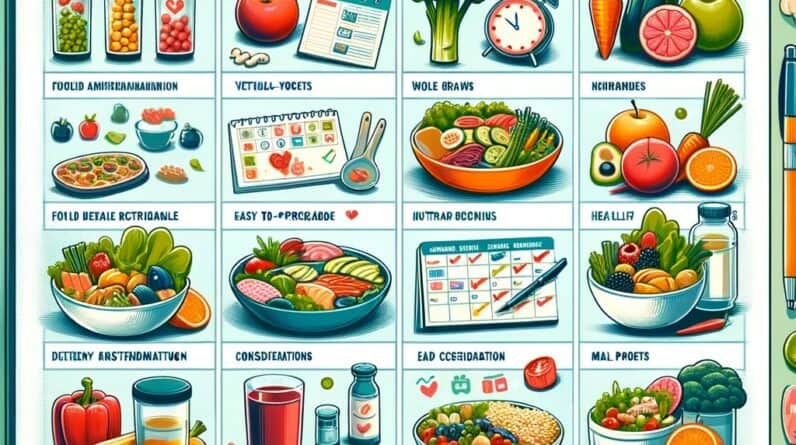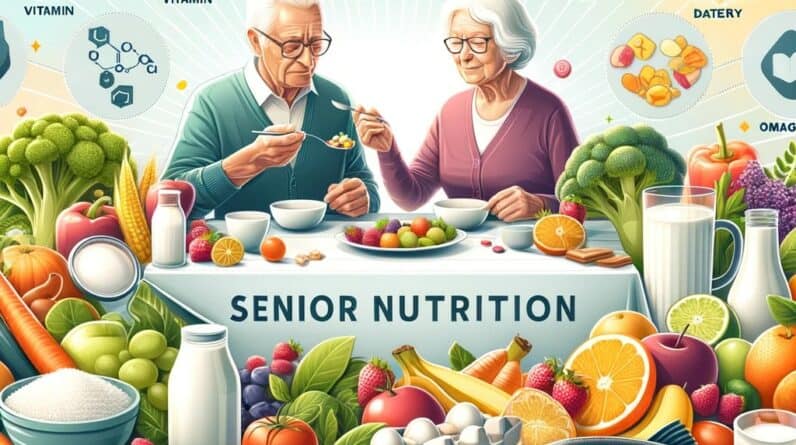Understanding Nutritional Needs in the Golden Years
The impact of aging on metabolism and nutritional requirements


Dementia Discovery That is Leaving Doctors Speechless (Try This Tonight)
Better than Morphine For Joint Pain… Yet Safer Than Aspirin?
Retire With Freedom. Start Earning Extra Cash Today.
Aging significantly impacts an individual’s metabolism and nutritional requirements, leading to various changes that necessitate adjustments in dietary habits.
As we age, our metabolism naturally slows down, a process that begins as early as our 30s. This deceleration in metabolic rate means that seniors require fewer calories to maintain their body weight and function effectively.
However, while the need for calories decreases, the demand for certain nutrients increases.
For instance, the absorption of vitamins and minerals such as calcium, vitamin D, and B12 becomes less efficient with age, requiring a more focused approach to ensuring these essential nutrients are adequately included in a senior’s diet.
Furthermore, age-related changes in body composition, such as a decrease in lean muscle mass and an increase in fat tissue, also affect metabolic health, emphasizing the need for a balanced diet that supports muscle maintenance and overall health.
Another critical aspect of aging is the alteration in appetite and eating patterns. Many seniors experience a reduced sense of taste and smell, leading to diminished appetite and an altered perception of flavors.
This change can result in inadequate nutritional intake, affecting their overall health and exacerbating age-related conditions.
To combat this, it’s essential to focus on a nutrient-dense diet that is both appealing and easy to consume, considering factors like dental health and digestion.
Foods rich in fiber, protein, and essential fatty acids are crucial for maintaining energy levels and supporting cognitive function. Including a variety of colorful fruits and vegetables, whole grains, lean proteins, and healthy fats can make meals more appealing and nutritionally beneficial.
Additionally, staying hydrated is paramount, as seniors are more prone to dehydration, which can further impact metabolism and overall health.
By acknowledging these age-related changes and adapting dietary habits accordingly, seniors can better manage their metabolism and meet their nutritional needs, ultimately supporting a healthier and more active lifestyle in their later years.
Key nutrients essential for senior health
Maintaining optimal health in senior years necessitates a keen focus on key nutrients that are essential for aging bodies.
Calcium and Vitamin D are paramount for bone health, especially as the risk of osteoporosis and fractures increases with age.
Calcium supports the structure and strength of bones and teeth, while Vitamin D enhances calcium absorption and bone growth.
Seniors should seek to include calcium-rich foods like dairy products, leafy greens, and fortified cereals in their diet, alongside vitamin D sources such as fatty fish, egg yolks, and fortified milk.
Another crucial nutrient is Vitamin B12, which supports nerve function and the production of DNA and red blood cells. With age, the body’s ability to absorb Vitamin B12 from food diminishes, making supplementation or consumption of fortified foods a wise choice for older adults.
Equally important are dietary fiber and omega-3 fatty acids. Fiber is essential for digestive health, helping to prevent constipation, a common issue in seniors.
It also aids in controlling blood sugar levels and maintaining a healthy weight. High-fiber foods include whole grains, vegetables, fruits, and legumes.
Omega-3 fatty acids, found in fish, flaxseeds, and walnuts, are crucial for heart health, reducing inflammation, and potentially enhancing brain health.
As cognitive function and heart health are of particular concern in the elderly, incorporating these fats into a senior’s diet is beneficial. Additionally, staying hydrated is crucial for senior health.
Adequate water intake aids in digestion, nutrient absorption, and the prevention of urinary tract infections and kidney stones, common health issues in the elderly.
By emphasizing these key nutrients and maintaining a balanced diet, seniors can significantly enhance their overall health and well-being, potentially preventing or mitigating age-related health issues.
Common dietary challenges and how to address them
One of the most prevalent dietary challenges faced by individuals is balancing nutrient intake with calorie consumption.
In today’s fast-paced lifestyle, where processed and convenience foods are readily available, it’s easy to consume more calories than needed without meeting nutritional requirements.
This imbalance can lead to weight gain, nutrient deficiencies, and associated health problems like obesity, diabetes, and heart disease.
To address this challenge, a focus on whole, nutrient-dense foods is vital. Incorporating a variety of fruits, vegetables, whole grains, lean proteins, and healthy fats ensures a wide range of essential nutrients while helping to control calorie intake.
Mindful eating practices, such as paying attention to hunger and fullness cues and avoiding distractions while eating, can also help in managing portion sizes and reducing the likelihood of overeating.
Another common dietary challenge is dealing with food allergies and intolerances, which can significantly limit food choices and make it difficult to obtain certain nutrients.
For instance, individuals with lactose intolerance or dairy allergies might struggle to get enough calcium and vitamin D. Similarly, those with celiac disease or gluten sensitivity must avoid gluten, which is found in many staple foods.
To overcome these challenges, it’s crucial to find alternative sources of these nutrients. For lactose intolerance, lactose-free dairy products, plant-based milk, and calcium-fortified foods can be good alternatives.
For those avoiding gluten, a variety of gluten-free grains like quinoa, rice, and buckwheat can replace wheat, barley, and rye.
Additionally, seeking guidance from a dietitian or nutritionist can be extremely beneficial in ensuring that dietary restrictions do not lead to nutritional deficiencies.
By being informed and creative with food choices, it’s possible to overcome these dietary challenges and maintain a balanced and healthful diet.
The Foundation of a Senior-Friendly Healthy Eating Plan
Balancing macronutrients: proteins, fats, and carbohydrates

Balancing macronutrients – proteins, fats, and carbohydrates – is crucial for maintaining a healthy diet and overall well-being. Proteins are essential for building and repairing tissues, making enzymes and hormones, and supporting immune function.
Sources of high-quality protein include lean meats, fish, poultry, eggs, dairy products, legumes, and nuts. It’s important not only to focus on the quantity but also the quality of proteins consumed.
Carbohydrates, often misunderstood and sometimes unduly vilified, are the body’s primary energy source.
They are found in foods like fruits, vegetables, grains, and legumes. Complex carbohydrates, high in fiber, are particularly beneficial as they provide sustained energy and help in digestive health.
Simple carbohydrates, found in sugary snacks and processed foods, should be limited as they can lead to spikes in blood sugar and contribute to weight gain.
Fats, the third macronutrient, are essential for nutrient absorption, nerve transmission, and maintaining cell integrity.
It’s important to choose healthy fats, such as those found in avocados, nuts, seeds, and olive oil, while limiting saturated and trans fats typically found in fried foods, baked goods, and processed snacks.
Balancing these macronutrients involves not only choosing the right types of each but also the correct proportions. This balance can vary depending on individual health goals, activity levels, and dietary needs.
For example, athletes might require a higher protein intake for muscle repair, while someone with a sedentary lifestyle might need fewer carbohydrates.
Understanding and applying the concept of macronutrient balance can lead to improved energy levels, better weight management, and overall enhanced health.
It’s also advisable to consult with a nutritionist or dietitian to create a personalized eating plan that aligns with specific health goals and dietary preferences.
The importance of hydration and tips for maintaining adequate fluid intake
Hydration plays a pivotal role in maintaining overall health and wellbeing, yet it is often overlooked in discussions about nutrition.
Water is essential for virtually every bodily function, including regulating body temperature, keeping joints lubricated, transporting nutrients, flushing out waste, and maintaining organ function.
Even mild dehydration can lead to headaches, lethargy, impaired concentration, and reduced physical performance. It becomes increasingly important as people age, as the sense of thirst may diminish, and the body’s ability to conserve water decreases.
To ensure adequate hydration, it’s not just about the quantity of fluids consumed; the quality and type of fluids matter significantly.
Water is the best choice for staying hydrated, but other fluids like herbal teas, milk, and broth also contribute to daily fluid intake. High water-content foods, such as fruits and vegetables, can also provide hydration.
To maintain proper hydration, it’s beneficial to develop habits that incorporate fluid intake throughout the day.
Carrying a water bottle can serve as a constant reminder to drink regularly. Setting reminders or using apps that prompt you to drink water at regular intervals can also be helpful.
It’s important to increase fluid intake in hot weather or when engaging in physical activity. Additionally, paying attention to the color of urine is a simple way to monitor hydration levels; pale yellow indicates good hydration, while dark yellow can signify a need for more fluids.
For those who find plain water unappealing, adding slices of fruits like lemon, lime, or cucumber can enhance the flavor, making it more enjoyable to drink. Herbal teas and infused waters are other tasty, low-calorie options.
It’s crucial, however, to limit beverages high in sugar, caffeine, and alcohol, as they can lead to dehydration. By making hydration a daily priority and using these simple strategies, individuals can significantly improve their health and vitality.
Incorporating fiber for digestive health
Incorporating fiber into the diet is crucial for promoting digestive health, a key component of overall wellness. Dietary fiber, found in plant-based foods, plays an essential role in maintaining a healthy digestive system.
It aids in regulating bowel movements, preventing constipation, and can even reduce the risk of developing certain conditions such as diverticulitis and hemorrhoids.
Soluble fiber, found in oats, nuts, beans, lentils, apples, and blueberries, is particularly beneficial as it dissolves in water to form a gel-like substance in the gut.
This type of fiber helps to slow down digestion, allowing for better absorption of nutrients and can also assist in lowering blood cholesterol and glucose levels.
Insoluble fiber, found in whole grains, nuts, seeds, and many vegetables and fruits, adds bulk to stool and helps food pass more quickly through the stomach and intestines, aiding in regular bowel movements.
To effectively incorporate fiber into the diet, it is important to gradually increase intake to prevent digestive discomfort like bloating or gas.
Aiming for a variety of fiber-rich foods ensures a balance of both soluble and insoluble fibers. Whole grains, such as whole wheat bread, brown rice, and barley, are excellent sources of fiber.
Adding legumes, like beans and lentils, to meals not only boosts fiber intake but also provides protein. Snacking on fruits, vegetables, nuts, and seeds throughout the day can further increase fiber intake.
It’s also important to drink plenty of fluids; fiber works best when it absorbs water, making stools soft and easy to pass. However, it’s crucial to avoid excessive consumption of fiber-rich foods as it can lead to discomfort or nutrient absorption issues.
For individuals looking to improve their digestive health, consulting a healthcare provider or a dietitian can provide personalized advice on how to effectively incorporate fiber into their diet, taking into account their specific health needs and dietary preferences.
Designing a Balanced Meal Plan: Practical Tips and Ideas
Sample meal ideas that cater to senior dietary needs
Creating meal ideas that cater specifically to the dietary needs of seniors involves focusing on nutrient-dense foods that are easy to prepare and consume.
Breakfast could start with a bowl of oatmeal topped with sliced bananas and a sprinkle of walnuts.
Oatmeal is rich in soluble fiber, which is beneficial for heart health and digestive regularity, while bananas provide potassium, essential for maintaining healthy blood pressure levels.
Adding nuts like walnuts introduces healthy fats and additional protein, supporting overall cognitive function.
Alternatively, a smoothie made with Greek yogurt, mixed berries, and a handful of spinach offers a high-protein, antioxidant-rich start to the day.
Greek yogurt is an excellent source of calcium and probiotics, essential for bone health and digestive wellness, while berries and spinach provide vitamins, minerals, and fiber.
For lunch, a salad made with mixed greens, grilled chicken, cherry tomatoes, avocado, and a vinaigrette dressing can be both satisfying and nutritious.
This meal provides lean protein, essential fats, and a variety of vitamins and minerals. The inclusion of avocado not only adds flavor and creaminess but also supplies heart-healthy monounsaturated fats.
A soup and sandwich combo is another great option, especially for seniors who may have difficulty with chewing or digestion.
A pureed vegetable soup paired with a turkey and cheese sandwich on whole-grain bread offers a balance of protein, fiber, and essential nutrients, while also being gentle on the digestive system.
Dinner could feature baked salmon with a side of steamed broccoli and quinoa.
Salmon is an excellent source of omega-3 fatty acids, crucial for heart and brain health, while broccoli provides fiber and a host of vitamins and minerals.
Quinoa, as a whole grain, contributes additional fiber and protein. These meal ideas not only cater to the nutritional needs of seniors but also offer a variety of flavors and textures, making eating both a pleasurable and health-supportive experience.
Adaptations for those with dietary restrictions (diabetes, hypertension, etc.)
Adapting meals for individuals with dietary restrictions, such as diabetes and hypertension, requires careful consideration of food choices and preparation methods to manage and support their specific health conditions.
For those with diabetes, managing blood sugar levels is crucial, which involves monitoring carbohydrate intake, including the types and amounts.
Meals should be balanced with lean proteins, healthy fats, and high-fiber carbohydrates to slow down glucose absorption and prevent spikes in blood sugar.
For example, a diabetic-friendly meal could consist of grilled chicken breast, a small serving of brown rice, and a generous portion of steamed vegetables like broccoli and carrots.
Snacks could include low-glycemic fruits such as berries or an apple with a handful of almonds, providing essential nutrients without causing a significant rise in blood sugar.
For individuals with hypertension, reducing sodium intake is key to controlling blood pressure.
This involves choosing fresh, unprocessed foods over canned or packaged items that often contain high levels of added salt.
Incorporating potassium-rich foods like bananas, sweet potatoes, and spinach can also help counteract the effects of sodium and aid in blood pressure regulation.
A heart-healthy meal for someone with hypertension might include baked salmon seasoned with herbs and lemon, served with a side of quinoa, and a mixed greens salad dressed with olive oil and vinegar.
Avoiding high-sodium condiments and using herbs, spices, and citrus to flavor foods can make meals enjoyable while adhering to dietary restrictions.
Additionally, for both conditions, staying hydrated and limiting the intake of sugary beverages and alcohol is beneficial.
Consulting with a healthcare professional or dietitian can provide tailored advice and meal plans to meet individual dietary needs and preferences, ensuring both nutritional requirements and personal tastes are accommodated.
How to make meals enjoyable with variety and flavor while keeping health in mind
Making meals enjoyable while keeping health in mind is a delicate balance that can be achieved with a focus on variety and flavor.
The key is to incorporate a wide range of foods from different food groups to ensure a diverse intake of nutrients, while also using herbs, spices, and cooking techniques to enhance flavor without compromising health.
For instance, experimenting with cuisines from different cultures can introduce a variety of new flavors and ingredients.
A Mediterranean diet, rich in vegetables, fruits, whole grains, lean proteins, and healthy fats, is not only heart-healthy but also offers a palette of delicious flavors.
Utilizing herbs like basil, oregano, and rosemary, or spices like turmeric, cumin, and paprika, can add depth and complexity to dishes without the need for excessive salt or fat.
Grilling, roasting, and stir-frying are cooking methods that preserve the integrity of ingredients and bring out their natural flavors, making meals more enjoyable.
In addition, paying attention to the presentation of food can also enhance the dining experience.
The visual appeal of a meal can significantly impact our enjoyment of it. Serving meals on colorful plates, garnishing with fresh herbs, or appealingly arranging food can make even simple dishes feel special.
Incorporating a variety of textures and colors in each dish can also make meals more satisfying and appealing.
For example, a salad with crunchy nuts, creamy avocado, crisp greens, and bright, juicy tomatoes is not only nutritious but also a delight to the senses. Remember, eating should be a joyful experience.
By focusing on variety, flavor, and presentation, healthy meals can be both nourishing and enjoyable, encouraging a positive relationship with food.
Supplements and Senior Diets: What You Need to Know
When supplements are necessary and how to choose them
Supplements can play a vital role in filling nutritional gaps in our diets, especially in certain situations where dietary intake alone might not meet all of our nutritional needs.
They become particularly necessary for individuals with specific health conditions, dietary restrictions, or life stages where increased nutrient demands are present.
For instance, older adults might need vitamin D and calcium supplements to maintain bone health, while vegans may require vitamin B12 and iron supplements due to the absence of these nutrients in plant-based diets.
Pregnant women often need prenatal vitamins to ensure they and their developing baby receive adequate nutrients. However, it’s crucial to remember that supplements are not substitutes for a healthy diet but rather a means to complement it.
When choosing supplements, it’s important to consider factors like quality, efficacy, and safety.
Opting for brands that have been independently tested and verified by third-party organizations such as USP (United States Pharmacopeia) or NSF International can assure the product’s quality.
It’s also vital to choose supplements appropriate for one’s age, sex, and health conditions. For example, seniors might need a different multivitamin formulation than younger adults.
Reading labels carefully to understand the dosage and ingredients is crucial to avoid the potential overconsumption of certain vitamins or minerals, which can be harmful.
Consulting with a healthcare provider or a registered dietitian before starting any supplement regimen is highly recommended.
They can provide personalized advice based on individual health needs and can help navigate potential interactions with medications.
By approaching supplementation with a well-informed and cautious mindset, one can effectively use it to enhance overall health and well-being.
The role of vitamins D and B12, calcium, and other key supplements
Vitamins D and B12, along with calcium, play critical roles in maintaining overall health, each serving unique and essential functions in the body.
Vitamin D, often referred to as the “sunshine vitamin,” is crucial for bone health as it aids in the absorption of calcium and phosphorus.
This vitamin is also vital for immune system function and has been linked to mood regulation and the prevention of chronic diseases.
However, vitamin D deficiency is relatively common, especially in regions with limited sunlight exposure and among individuals with limited outdoor activities.
On the other hand, Vitamin B12 is essential for nerve function, the production of DNA and red blood cells, and contributes to brain health.
It’s particularly important for vegetarians and vegans, as B12 is primarily found in animal products, making supplementation often necessary for those following plant-based diets.
Calcium is another key supplement, especially important for older adults, postmenopausal women, and those with a high risk of osteoporosis.
It is vital for maintaining strong bones and teeth, and it also plays a role in muscle function, nerve signaling, and blood clotting.
Inadequate calcium intake can lead to weakened bones and an increased risk of fractures. In addition to these, other supplements like omega-3 fatty acids, iron, and probiotics are often recommended for specific health needs.
Omega-3 fatty acids, found in fish oil supplements, are known for their anti-inflammatory properties and benefits to heart and brain health.
Iron is crucial for those with anemia or women who are pregnant, and probiotics can aid in maintaining gut health, which is linked to overall wellness.
While these supplements are beneficial, it’s important to remember that they should complement, not replace, a balanced diet.
Consulting with a healthcare provider is essential to determine individual needs and avoid potential over-supplementation or interactions with medications.
By understanding and judiciously using these key supplements, one can effectively support their health and well-being.
Avoiding over-supplementation and potential interactions with medications
Avoiding over-supplementation is crucial in maintaining health and preventing adverse effects that can arise from excessive intake of vitamins and minerals.
Over-supplementation can lead to a condition known as hypervitaminosis, where an excess of certain vitamins, particularly fat-soluble vitamins like A, D, E, and K, accumulate in the body, potentially causing toxicity.
Symptoms of over-supplementation can range from mild to severe, including headaches, dizziness, nausea, and more serious consequences like liver damage or increased risk of bleeding.
It’s important to adhere to recommended daily allowances (RDAs) and upper intake levels (ULs) for various nutrients.
These guidelines are designed to provide the maximum daily intake unlikely to cause adverse health effects. When considering supplements, it’s essential to review one’s diet first to assess if supplementation is necessary and, if so, to what extent.
Moreover, potential interactions between supplements and medications are a significant concern.
Certain supplements can either enhance or inhibit the effectiveness of medications, leading to unintended health consequences.
For instance, supplements like St. John’s Wort can interfere with the effectiveness of antidepressants, birth control pills, and blood thinners.
Calcium supplements might reduce the absorption of certain antibiotics, while high doses of vitamin K can counteract the blood-thinning effects of warfarin.
To prevent these interactions, individuals should always inform their healthcare providers about all the supplements they are taking.
This includes not only vitamins and minerals but also herbal products and other over-the-counter supplements.
A healthcare professional can guide appropriate supplementation and help manage any potential interactions with medications.
Ultimately, while supplements can play a valuable role in supporting health, they should be used judiciously and under professional supervision to ensure safety and efficacy.
Staying on Track: Tools and Strategies for a Sustainable Healthy Diet
Utilizing technology and resources for meal planning and grocery shopping

Utilizing technology and resources for meal planning and grocery shopping has revolutionized the way we approach our dietary habits.
Digital tools like meal planning apps and websites offer convenient solutions to organize weekly menus, manage recipes, and track nutritional intake.
These platforms often feature customizable meal plans that cater to specific dietary needs and preferences, such as low-carb, gluten-free, vegetarian, or calorie-controlled diets.
They can also generate shopping lists based on meal plans, streamlining the grocery shopping process.
This not only saves time but also helps in reducing food waste and impulse purchases, leading to more efficient and cost-effective shopping experiences.
Additionally, many of these apps integrate with fitness trackers and dietary logs, providing a comprehensive overview of one’s health and nutritional goals.
Furthermore, the advent of online grocery shopping and delivery services has added another layer of convenience.
These services allow individuals to select groceries from the comfort of their homes and have them delivered at a convenient time, which is particularly beneficial for those with busy schedules or mobility issues.
Advanced features like order history recall make it easy to repurchase staple items, while options to filter products based on dietary restrictions, organic preferences, or price range aid in making healthier choices.
Some services even offer recipe suggestions and meal kits, which include pre-measured ingredients for specific recipes, reducing prep time and simplifying the cooking process.
By leveraging these technological advancements, individuals can make informed, efficient, and health-conscious choices when it comes to meal planning and grocery shopping, ultimately leading to a more structured and stress-free approach to eating healthily.
The importance of social dining and community resources
The importance of social dining in promoting psychological and physical well-being, particularly among the elderly and those living alone, cannot be overstated.
Sharing meals with others is not just about sustenance but also about creating and strengthening social bonds.
Social dining experiences, whether they’re family gatherings, community potlucks, or dining in senior centers, provide opportunities for interaction, combatting feelings of loneliness and isolation.
These interactions are crucial for mental health, as they can significantly improve mood, boost self-esteem, and provide a sense of belonging and community.
For the elderly, in particular, communal meals can be a source of joy and a reason to stay socially active, contributing to better mental and emotional health.
Additionally, eating with others often encourages healthier eating habits, as meals tend to be more balanced and nutrient-dense compared to eating alone.
Community resources play a pivotal role in facilitating social dining experiences, especially for those who may have limited access to social interactions.
Many communities offer meal programs in local centers, religious institutions, or through services like Meals on Wheels, which not only provide nutritious food but also a chance to interact with others.
These programs are often tailored to the dietary needs of specific groups, like seniors or individuals with certain health conditions, ensuring that they receive appropriate nutrition.
Beyond just providing meals, these community resources often include educational programs about healthy eating, cooking demonstrations, and workshops, fostering a sense of learning and engagement.
These initiatives can significantly enrich the lives of participants, offering both nutritional benefits and the invaluable opportunity to connect with others.
In a world where individualism is increasingly prevalent, the role of social dining and community resources in fostering a sense of togetherness and community well-being is more important than ever.
Monitoring health changes and adjusting the diet accordingly
Monitoring health changes and adjusting the diet accordingly is a crucial aspect of maintaining optimal health throughout different stages of life.
As our bodies age or as we encounter various health challenges, our nutritional requirements can change significantly.
For example, an individual diagnosed with diabetes may need to adjust their carbohydrate intake and focus on a diet rich in fiber, lean protein, and healthy fats to manage blood sugar levels.
Similarly, someone with heart disease might need to reduce their intake of saturated fats and sodium while increasing their consumption of heart-healthy omega-3 fatty acids found in fish and flaxseeds.
Regular health check-ups and keeping track of key health indicators like blood pressure, cholesterol levels, and blood sugar can provide valuable insights into how well your diet aligns with your health needs.
Furthermore, life events such as pregnancy, recovery from surgery, or periods of high stress can also necessitate dietary adjustments.
During pregnancy, for instance, increased intake of folic acid, iron, and calcium is essential for the health of both the mother and the developing fetus.
Post-surgery, a diet rich in protein, vitamins A and C, and zinc can aid in the healing process. In times of stress, it may be beneficial to increase the intake of B vitamins and magnesium, which are known to help with the management of stress.
It’s important to be attentive to the body’s signals and seek professional advice from healthcare providers or dietitians when significant health changes occur.
They can offer tailored dietary recommendations and adjustments that not only address specific health concerns but also take into account personal preferences and lifestyle factors.
By actively monitoring health status and being adaptable to dietary choices, individuals can significantly enhance their ability to maintain good health and well-being.
Healthy Eating Plan For Seniors – Conclusion
In summary, navigating the complexities of nutrition and dietary needs is a multifaceted endeavor that plays a critical role in maintaining health and well-being across various life stages.
From understanding the impact of aging on metabolism and the importance of key nutrients for seniors to addressing common dietary challenges and the necessity of balancing macronutrients, each aspect highlights the importance of a well-rounded and mindful approach to eating.
Incorporating fiber for digestive health, understanding when and how to use supplements, and recognizing the significance of vitamins like D and B12, calcium, and other supplements underscore the need for a diet that supports specific health conditions and overall wellness.
Moreover, the discussion extends beyond individual dietary choices, emphasizing the value of social dining and community resources in fostering not just physical health but also mental and emotional well-being.
The utilization of technology in meal planning and grocery shopping has emerged as a powerful tool in ensuring consistent and healthy dietary habits, adapting to the evolving landscape of our daily lives.
The importance of monitoring health changes and adjusting diets accordingly reminds us that our nutritional needs are dynamic and require ongoing attention and adaptation.
Collectively, these topics provide a comprehensive overview of the critical elements of nutrition and health, emphasizing that a balanced diet, awareness of individual health needs, and a proactive approach to eating are integral to long-term health and quality of life.
This holistic perspective on nutrition and health serves as a guiding framework, encouraging informed choices and a deeper understanding of the crucial role food plays in our lives.
Disclaimer: The information in this article is intended for educational and entertainment purposes only and should not be used instead of or contrary to that of a medical professional.
Before taking supplements, starting a new diet, or embarking on a new exercise regime please consult a medical or nutritional professional.
The owners of “Getting Healthy After 50” are not medical professionals and are simply redistributing information that is freely available on the internet.






